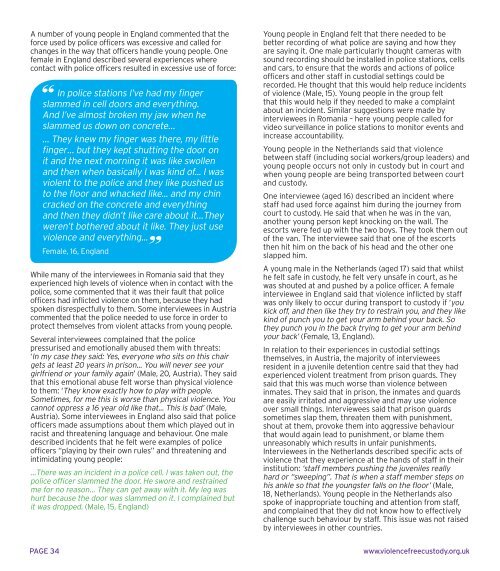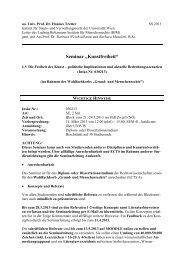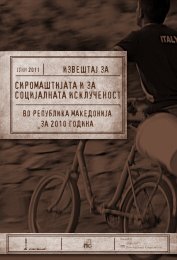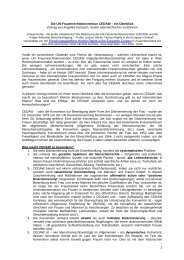speaking freely - 404 Page not found
speaking freely - 404 Page not found
speaking freely - 404 Page not found
You also want an ePaper? Increase the reach of your titles
YUMPU automatically turns print PDFs into web optimized ePapers that Google loves.
A number of young people in England commented that the<br />
force used by police officers was excessive and called for<br />
changes in the way that officers handle young people. One<br />
female in England described several experiences where<br />
contact with police officers resulted in excessive use of force:<br />
In police stations I’ve had my finger<br />
slammed in cell doors and everything.<br />
And I’ve almost broken my jaw when he<br />
slammed us down on concrete…<br />
… They knew my finger was there, my little<br />
finger… but they kept shutting the door on<br />
it and the next morning it was like swollen<br />
and then when basically I was kind of... I was<br />
violent to the police and they like pushed us<br />
to the floor and whacked like... and my chin<br />
cracked on the concrete and everything<br />
and then they didn’t like care about it…They<br />
weren’t bothered about it like. They just use<br />
violence and everything...<br />
Female, 16, England<br />
While many of the interviewees in Romania said that they<br />
experienced high levels of violence when in contact with the<br />
police, some commented that it was their fault that police<br />
officers had inflicted violence on them, because they had<br />
spoken disrespectfully to them. Some interviewees in Austria<br />
commented that the police needed to use force in order to<br />
protect themselves from violent attacks from young people.<br />
Several interviewees complained that the police<br />
pressurised and emotionally abused them with threats:<br />
‘In my case they said: Yes, everyone who sits on this chair<br />
gets at least 20 years in prison... You will never see your<br />
girlfriend or your family again’ (Male, 20, Austria). They said<br />
that this emotional abuse felt worse than physical violence<br />
to them: ‘They know exactly how to play with people.<br />
Sometimes, for me this is worse than physical violence. You<br />
can<strong>not</strong> oppress a 16 year old like that... This is bad’ (Male,<br />
Austria). Some interviewees in England also said that police<br />
officers made assumptions about them which played out in<br />
racist and threatening language and behaviour. One male<br />
described incidents that he felt were examples of police<br />
officers “playing by their own rules” and threatening and<br />
intimidating young people:<br />
…There was an incident in a police cell. I was taken out, the<br />
police officer slammed the door. He swore and restrained<br />
me for no reason… They can get away with it. My leg was<br />
hurt because the door was slammed on it. I complained but<br />
it was dropped. (Male, 15, England)<br />
Young people in England felt that there needed to be<br />
better recording of what police are saying and how they<br />
are saying it. One male particularly thought cameras with<br />
sound recording should be installed in police stations, cells<br />
and cars, to ensure that the words and actions of police<br />
officers and other staff in custodial settings could be<br />
recorded. He thought that this would help reduce incidents<br />
of violence (Male, 15). Young people in the group felt<br />
that this would help if they needed to make a complaint<br />
about an incident. Similar suggestions were made by<br />
interviewees in Romania – here young people called for<br />
video surveillance in police stations to monitor events and<br />
increase accountability.<br />
Young people in the Netherlands said that violence<br />
between staff (including social workers/group leaders) and<br />
young people occurs <strong>not</strong> only in custody but in court and<br />
when young people are being transported between court<br />
and custody.<br />
One interviewee (aged 16) described an incident where<br />
staff had used force against him during the journey from<br />
court to custody. He said that when he was in the van,<br />
a<strong>not</strong>her young person kept knocking on the wall. The<br />
escorts were fed up with the two boys. They took them out<br />
of the van. The interviewee said that one of the escorts<br />
then hit him on the back of his head and the other one<br />
slapped him.<br />
A young male in the Netherlands (aged 17) said that whilst<br />
he felt safe in custody, he felt very unsafe in court, as he<br />
was shouted at and pushed by a police officer. A female<br />
interviewee in England said that violence inflicted by staff<br />
was only likely to occur during transport to custody if ‘you<br />
kick off, and then like they try to restrain you, and they like<br />
kind of punch you to get your arm behind your back. So<br />
they punch you in the back trying to get your arm behind<br />
your back’ (Female, 13, England).<br />
In relation to their experiences in custodial settings<br />
themselves, in Austria, the majority of interviewees<br />
resident in a juvenile detention centre said that they had<br />
experienced violent treatment from prison guards. They<br />
said that this was much worse than violence between<br />
inmates. They said that in prison, the inmates and guards<br />
are easily irritated and aggressive and may use violence<br />
over small things. Interviewees said that prison guards<br />
sometimes slap them, threaten them with punishment,<br />
shout at them, provoke them into aggressive behaviour<br />
that would again lead to punishment, or blame them<br />
unreasonably which results in unfair punishments.<br />
Interviewees in the Netherlands described specific acts of<br />
violence that they experience at the hands of staff in their<br />
institution: ‘staff members pushing the juveniles really<br />
hard or “sweeping”. That is when a staff member steps on<br />
his ankle so that the youngster falls on the floor’ (Male,<br />
18, Netherlands). Young people in the Netherlands also<br />
spoke of inappropriate touching and attention from staff,<br />
and complained that they did <strong>not</strong> know how to effectively<br />
challenge such behaviour by staff. This issue was <strong>not</strong> raised<br />
by interviewees in other countries.<br />
PAGE 34<br />
www.violencefreecustody.org.uk

















